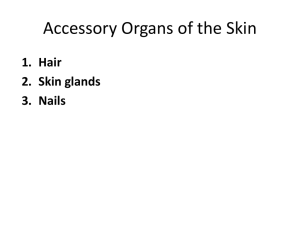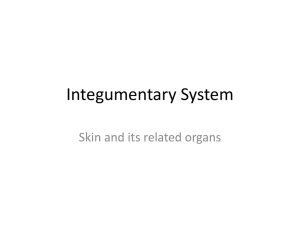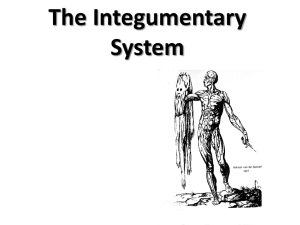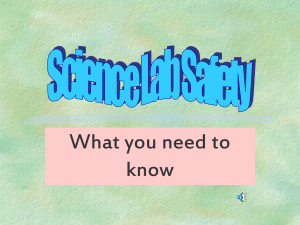click - Uplift Education
advertisement
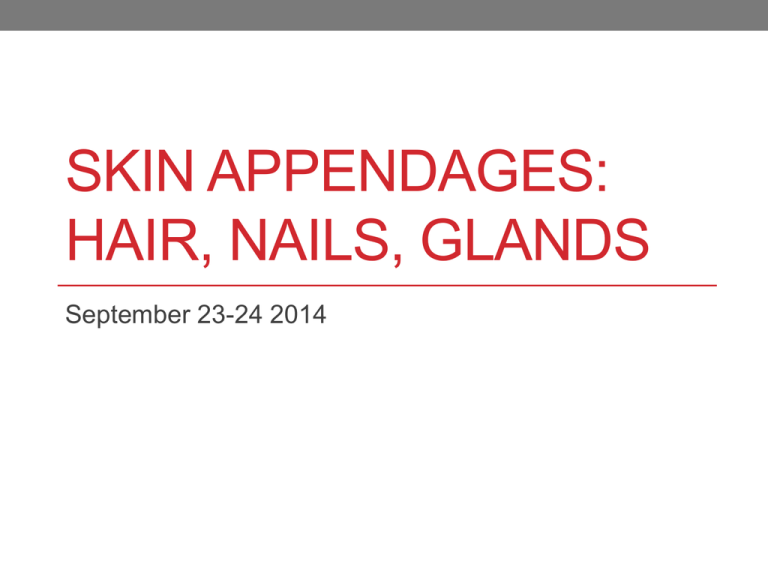
SKIN APPENDAGES: HAIR, NAILS, GLANDS September 23-24 2014 Skin Appendages The skin appendages include cutaneous glands, hair, and nails. Cutaneous Glands What is cutaneous? What is an exocrine gland? Cutaneous Glands What is cutaneous? Relating to the skin What is an exocrine gland? A gland that releases its product to a particular site, rather than into the blood stream. (Endocrine glands release their products to the blood). Cutaneous Glands 1) Sebaceous (oil) glands • Found everywhere except palms of hands and soles of feet • The ducts mostly empty into hair follicles • Produce oily product called sebum • Functions: • Keep hair and skin from drying out • Kill bacteria • Become much more active in adolescence Cutaneous Glands 1) Sebaceous (oil) glands Fun fact: the ‘pores’ on our faces are actually hair follicles • Found everywhere except palms of hands and soles of feet • The ducts mostly empty into hair follicles • Produce oily product called sebum • Functions: • Keep hair and skin from drying out • Kill bacteria • Become much more active in adolescence Acne occurs when the hair follicle is clogged with sebum. Cutaneous Glands 2) Sweat (sudoriferous) glands • Eccrine glands produce sweat (water, salt, urea, lactic acid) • Duct lead to pores in skin • Functions • Thermoregulation • Excretion • Bacterial inhibition (sweat is acidic) • Apocrine glands produce a milky secretion fully of fatty acids and proteins. • Small duct leads to hair follicle • Function: Pheromone! Cutaneous Glands 2) Sweat (sudoriferous) Notice that sweat glands, since they empty into the skin, are glands often farther and deeper than sebaceous glands • Eccrine glands produce sweat (water, salt, urea, lactic acid) • Duct lead to pores in skin • Functions • Thermoregulation • Excretion • Bacterial inhibition (sweat is acidic) • Apocrine glands produce a milky secretion full of fatty acids and proteins. • Duct leads to hair follicle • Function: Pheromone! Fun fact: Randy Thornhill’s work Cutaneous Glands – Quick Review Make a Venn Diagram comparing the three types of cutaneous glands. You may work with a partner. 5 min Hair follicle Why/when do the arrector pili muscles contract? The arrector pili muscles contract when we are cold, to raise the hairs and reduce heat loss • The hair follicle is surrounded by a thin layer of epidermal tissue. • The follicle is slanted unless the arrector pili muscles are contracted Change the words on the diagram of your guided notes Dermal epidermal hair bulb Hair • Hair can be divided into the shaft (part outside of body) and root (inside body) • Hair is produced by epithelial cells in the hair bulb, but as the cells are pushed away from the bulb they begin to die. • Like the outer layer of the skin, the hair shaft is composed of dead, keratinized cells. Fun fact: Round shaft = straight, coarse hair Oval shaft = silky, wavy hair Flat shaft = curly hair Nails • Produced by epithelial cells • The nail root, closest to the nail matrix, is living • The outer part, like the hair and skin, consists of dead keratinized cells. Fun fact: Fingernails are a derived trait in primates Quick Review Turn & Talk. Be prepared to share with the class. Are the skin appendages (cutaneous glands, hair, hair follicles, and nails) found in the dermis or epidermis? Justify your answer. Quick Review Turn & Talk. Be prepared to share with the class. Are the skin appendages (cutaneous glands, hair, hair follicles, and nails) found in the dermis or epidermis? Justify your answer. They are in the epidermis, because the epidermis surrounds and gives rise to these structures. However, these structures usually sit deeper than the most of the epidermal tissue. Label the diagram Label the diagram • A: epidermis • B: dermis • C: hypodermis • 1: hair shaft • 2: pores • 3: Eccrine gland • 4: sebaceous gland • 5: capillary What did we talk about today that you don’t see on this diagram? Label the diagram • A: epidermis • B: dermis • C: hypodermis • 1: hair shaft • 2: pores • 3: Eccrine gland • 4: sebaceous gland • 5: capillary What did we talk about today that you don’t see on this diagram? Apocrine glands. Identify the parts of the skin 1 4 5 6 2 7 8 3
